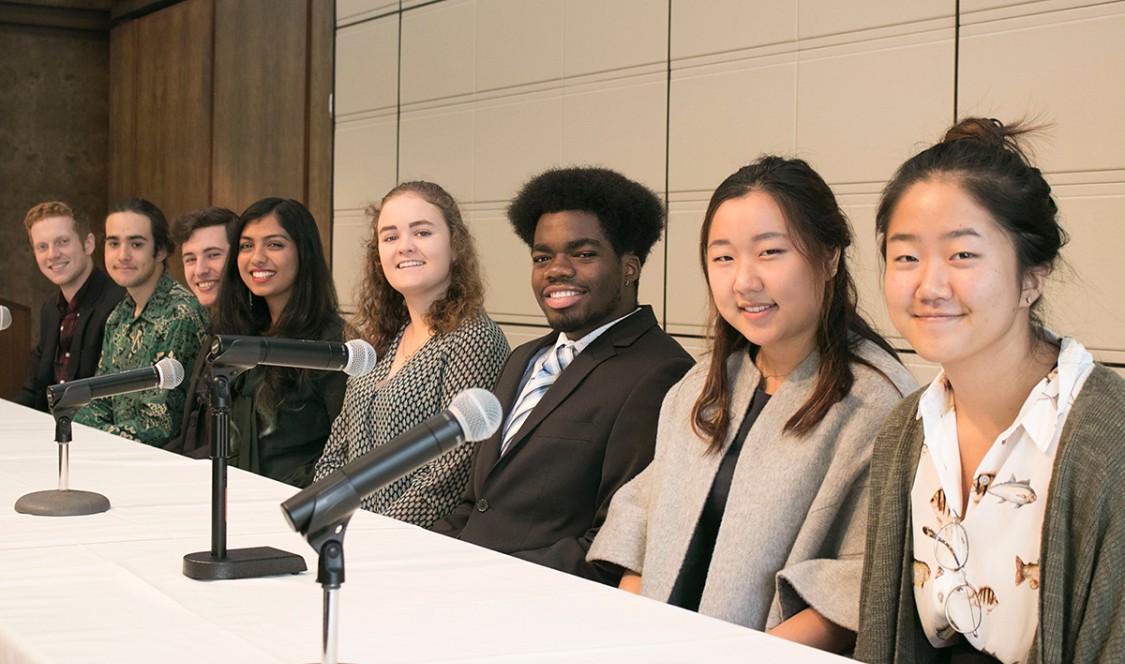During her first year at Claremont McKenna College, Becky Chung ’20 wondered how the changing global climate would affect her hobby of mountaineering.
Through the Appel Fellowship, a writing program that encourages first-year CMC students to explore such ideas, she was able to travel to Fiji and New Zealand last summer. In Fiji, as she climbed Wayasewa Island’s volcanic mountain range, she saw empty, roofless buildings below her. They were the remains of a once-thriving village. Her climbing partner, a resident of the island, said locals had to move farther from the beach because of rising sea level.
“I wanted an experience, not an internship,” said Chung, whose resulting article about the trip will appear in Alpinist magazine.
The Appel Fellowship for First Year Students provides funding for unique experiences that inspire independent writing projects. Members of the most recent cohort traveled across the United States and abroad, and then returned to campus to share their work.
Joel Appel ’87, former CEO of Orange Glo International, maker of cleaning product OxiClean, established the fellowship in his family’s name. He wanted first year students to have meaningful experiences that they could write about.
“Writing about your experiences,” Appel said, “forces you to consider how they influence your life.”
CMC’s Center for Writing and Public Discourse administers the Appel Fellowship. Employers increasingly place a high value on writing skills, said the center’s director, Christine Crockett ’01. Naturally, she said, CMC students can boost their professional profiles by taking on writing projects.
Beyond the practical value, Crockett said, the travel component of the fellowship reinforces the belief that students benefit from a global outlook.
Biochemistry student Taylor Hughes ’20 wanted to write a children’s book. With her fellowship funding, she took writing workshops specifically for children’s authors. In the workshops, she developed her characters and plotted out the story. What started as a picture book grew into a full novel, she said.
Shreya Bhatnagar ’20 returned to her native India. She planned to write short stories about the country from a tourist’s perspective. To capture this point of view, she trekked across South India using only public transportation. She had to navigate four languages to meet and interview locals.
When she wasn’t on a bus or a train, she was writing in cafes and restaurants throughout a 11-city region. “Writing in my notebook in these little cafes felt like something Ernest Hemingway would do,” Bhatnagar said.
In Indonesia, Jafar Daniel ’20 worked with a film company on a documentary about the palm oil industry. Driving through row after row of oil palms was like seeing the same tree go on forever, he said.
Daniel conducted a series of interviews for the film, speaking with residents of rural communities that once bordered the plantations. He interviewed a young father whose infant daughter had died from an untreated illness just weeks earlier. The man said he and his family were homeless and lacked resources because a development project had destroyed their village.
“These people are victims to the most profitable cash crop in the world,” Daniel said.

Zoey Ryu ’20 used her funding to live in Incheon International Airport in South Korea for one week. She had traveled through the airport many times as a child. Alain de Botton’s book “A Week at the Airport” inspired her to see what living inside the airport would be like now that she was older.
Ryu, who grew up in the United States and South Korea, wrote: “Who was I in Korea? Did I even pass as Korean in Korea? The ‘never fully both, not enough for either’ and ‘too foreign there, too foreign here’ theme took over for a long time until … I came to reconcile both under the umbrella of ‘third-culture.’ The only sanctuary up until then was the airport, the physical embodiment of the ‘in-between.’”
Other students explored the United States for their writing projects.
Nick Sage ’20 drove 9,637 miles to “take a deeper, more personal look at America’s past.” He visited historically notable national landmarks, monuments, and other sites throughout the U.S.
Sage walked the length of the Edmund Pettus Bridge in Selma, Ala. In 1965, civil rights protestors were attacked on the bridge during a march from Selma to Montgomery. A week later, he visited Lee Circle in New Orleans, where a 16-foot-tall bronze statue of Confederate Gen. Robert E. Lee had been removed a month earlier. An empty 60-foot pedestal column remained.
Gabe Gluskin-Braun ’20 also took a road trip. He drove through 20 states to visit skate parks and meet other skaters. His first stop was a concrete park on the banks of the Cuyahoga River in Cleveland. He ended the trip skating beneath the Highway 99 overpass in Seattle.
Although Gluskin-Braun had imagined writing short fiction, his pieces became vignettes or “long impressionistic poems.” He wasn’t pressured to stick to a rigid writing format, he said. His advisers encouraged him to write whatever came to mind.
Like Sage and Gluskin-Braun, Isaiah Tulanda ’20 traveled across the United States by car. He wanted to meet Americans with political and social perspectives different from his own. He visited such varied locations as the Brown v. Board of Education National Historic Site in Topeka, Kan.; houses of worship, including a Mormon temple in Salt Lake City; a gun show in Denver; and regional comedy clubs.
To learn more about the people he met, Tulanda came up with a list of questions, including “Who did you idolize or look up to when you were growing up and why?” and “What are some pressing issues facing your community?”
“I don’t think people can ever pop whatever bubble they live in, it’s human nature and it gives us a sense of security,” Tulanda wrote in his blog, Twolands Travels, “but I hope to expand my bubble to better understand and be cognizant of what this country encompasses.”
—Michael Tesauro

